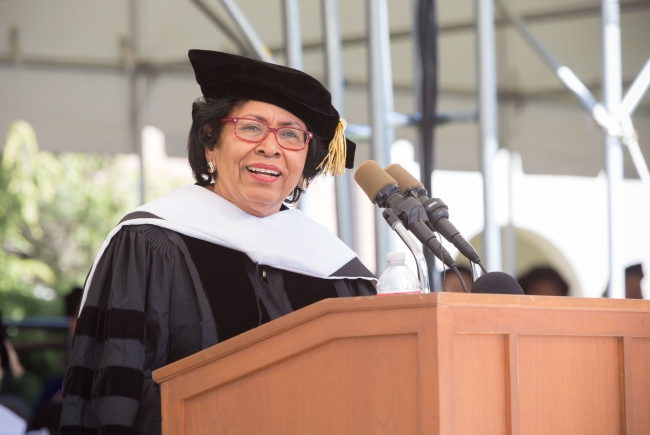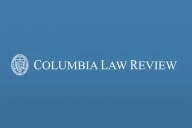You have /5 articles left.
Sign up for a free account or log in.

Ruth Simmons speaks Sunday at Smith College.
Smith College
In a season in which numerous commencement speakers withdrew amid protests over their past actions or points of view, the academic leaders who stepped in for two of them sought to strike a blow for free speech and the crucial place of disagreement and free exchange in higher education. And one of them did so in a unusually direct way that appeared to hurt the feelings of some of the graduates.
Every year sees its share of graduation-speech controversies. But this year's crop managed to spur particularly intense debate because some of those who drew students' enmity were generally well-regarded and well-credentialed leaders who were not the kind of overtly partisan political figures who more commonly spur these sorts of protests. Robert Birgeneau withdrew as a speaker at Pennsylvania's Haverford College last week after some students and faculty members criticized how police at the University of California at Berkeley had treated some student protesters while he was chancellor there. At Smith College, Christine Lagarde, the head of the International Monetary Fund, backed out after a cadre of students criticized IMF policies that contribute to global inequality, while others noted the irony that students at the women's college were objecting to someone who champions women's rights around the globe.
These controversies led some commentators to ask whether the bar for satisfying today's students has risen to an impossibly high level -- and others to criticize the protests as political correctness run amok.
Conversation on
Commencement Controversies
The topic was one of several
discussed Friday on This Week
@ Inside Higher Ed, our new
audio discussion of the week's
top headlines. Listen here.
It would have been easy for those who spoke at those ceremonies to avoid or at least play down the controversies, since at least some of the drama surrounding the speeches involved the protesters' perspective that the day should be about the graduates and not the (arguably) contentious views of the speakers.
But that's not the path that the speakers at Haverford and Smith chose. William G. Bowen, the former president of Princeton University and the Andrew W. Mellon Foundation, was -- as another of the honorary degree recipients -- already scheduled to speak on Sunday at Haverford ceremony. In his "first bite of the apple," as he called his initial 10-minute speech, he told an apocryphal story that made fun of honorary degree holders everywhere.
But in the days leading up to the commencement, Bowen said via email, he was encouraged "to say something about the rather confused controversy -- otherwise it might look as if many of us were simply ducking." So he volunteered, he said, to give a short second set of remarks in Birgeneau's place.
Bowen did not hold back. He disputed the statement by one of the Birgeneau protesters that the Berkeley chancellor's withdrawal as speaker was a "small victory" for the college. "It represents nothing of the kind," Bowen said. "I regard this outcome as a defeat, pure and simple, for Haverford -- no victory for anyone who believes, as I think most of us do, in both openness to many points of view and mutual respect."
Rather than send Birgeneau an "intemperate" set of demands, Bowen said, the protesters "should have encouraged him to come and engage in a genuine discussion, not to come, tail between his legs, to respond to an indictment that a self-chosen jury had reached without hearing counter-arguments."
Bowen did not let the ex-Berkeley chancellor off the hook either. "I think that Birgeneau, in turn, failed to make proper allowance for the immature, and, yes, arrogant inclinations of some protestors," Bowen said. "Aggravated as he had every right to be, I think he should be with us today."
The former Princeton president recalled (as having had greatly preferable outcomes) controversies when students silently protested Princeton's awarding of an honorary degree three decades ago to George P. Shultz, and the Rev. Theodore Hesburgh's defense of the University of Notre Dame's decision to invite President Obama to speak there in 2009; Father Hesburgh, as a legendary former Notre Dame president, helped bridge the gap with his description of the university as a both a "lighthouse" for Roman Catholic principles and a "crossroads" where differing perspectives could meet.
"It is my hope that this regrettable set of events will prove, under President [Dan] Weiss’s leadership, to be a true 'learning moment,' and that Haverford will go forward, as I am confident that it will, as a great liberal arts college committed, as always, to both the principle of non-violent protest and to the enduring values of openness and respect for diverse views," Bowen concluded.
Simmons at Smith
Stepping in for Lagarde at Smith, which she once led, Ruth Simmons, the recently retired president of Brown University, took a somewhat gentler approach than Bowen did. Acknowledging the circumstances that led Lagarde to withdraw, she recounted her own history as a speaker of unpopular views developed through decades of exposure to racial and other discrimination, and her own decision to allow Brown to host a speaker who believed black Americans were better off for having been enslaved.
"One’s voice grows stronger in encounters with opposing views," she told the Smith graduates.
Universities have a "special obligation" to enable such encounters, she said. "The collision of views and ideologies is in the DNA of the academic enterprise. No collision avoidance technology is needed here. The noise from this discord may cause others to criticize the legitimacy of the academic enterprise, but how can knowledge advance without the questions that overturn misconceptions, push further into previously impenetrable areas of inquiry and assure us stunning breakthroughs in human knowledge?"
Learning at its best grows from that "jangling discord," Simmons said. She said she hoped Smith students would have another chance to hear from Lagarde, whom Simmons said she admired.
"I hope you will invite her to be a part of this discord in the future," Simmons said, "and that she will accept your invitation."









